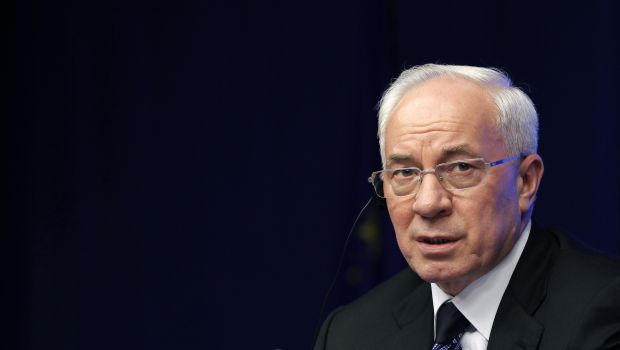
Ukraine’s Prime Minister Mykola Azarov addresses a news conference after an European Union-Ukraine cooperation council in Brussels, in this May 15, 2012 file photo. (REUTERS/Francois Lenoir/Files)
The 66-year-old Azarov announced his decision as parliament met for an emergency session to work out possible concessions to the opposition to end street protests in the capital Kiev and in other cities in which six people have been killed.
Azarov, a loyal lieutenant of Yanukovych since the latter was elected to power in February 2010, said he was offering to step down “with the aim of creating extra means for finding a social-political compromise, for the sake of a peaceful settlement of the conflict.”
But in reality he has been publicly humiliated by Yanukovych’s offer at the weekend to give his job to former economy minister Arseny Yatsenyuk, one of the opposition leaders, in an effort to stem the rising protests against his rule.
The opposition has been calling consistently for the resignation of the Azarov government since the onset of the crisis. But opposition leaders have shied away from the offer of top government posts by Yanukovych, seeing it as a trap intended to compromise them in front of their supporters on the streets.
Yatsenyuk, one of a “troika” of opposition leaders, formally turned down the offer of the top government job on Monday night and the question now was whether Yanukovych would accept Azarov’s departure or not.
Azarov has steered the heavily indebted economy through hard times over four years, keeping the national currency tightly pegged to the dollar and refusing International Monetary Fund pressure to raise gas prices at home.
He backed the decision in November to walk away from a free trade agreement with the European Union—the move which sparked the mass street protests—and it was Azarov who took the heat in parliament, defending the need for closer economic ties with Russia in a stormy debate with the opposition.
Parliament went into emergency session on Tuesday with ministers loyal to Yanukovych saying they would press for a state of emergency to be declared if the opposition leaders did not rein in protesters and end occupation of municipal and government buildings across the country.
Opposition leaders, who include boxer-turned-politician Vitaly Klitschko and nationalist Oleh Tyahnibok, are also pressing for the repeal of sweeping anti-protest laws rammed through parliament by Yanukovych loyalists on January 16.
A government reshuffle had also been slated for discussion at the emergency session but it was not clear now how this would proceed given Azarov’s resignation offer.
Another battle lies ahead over protesters detained during the unrest. The Yanukovych side said these would be pardoned, but only once protesters had ended their occupation of public buildings and blockade of roads.
The parliamentary session observed a moment of silence in respect of those who had been killed in the wave of unrest and parliament speaker Volodymyr Rybak then announced a recess.
Talk of a state of emergency being declared in the former Soviet republic of 46 million made the European Union’s foreign policy chief, Catherine Ashton, hastily move up a visit to Kiev on Tuesday.
US Vice President Joe Biden called Yanukovych on Monday to urge the government not to declare a state of emergency and to work with the opposition to bring a peaceful end to unrest.
“[Biden] underscored that the US condemns the use of violence by any side, and warned that declaring a State of Emergency or enacting other harsh security measures would further inflame the situation and close the space for a peaceful resolution,” the White House said.
Though the protest movement began because of Yanukovych’s U-turn on policy towards Europe, it has since turned into a mass demonstration, punctuated by clashes with police, against perceived misrule and corruption under Yanukovych’s leadership.
Several hundred people camp round-the-clock on Kiev’s Independence Square and along an adjoining thoroughfare, while more radical protesters confront police lines at Dynamo football stadium some distance away.
Yanukovych’s Party of the Regions and its allies hold a majority in the Ukrainian parliament but in reality pressure from the president and his aides behind the scenes can easily swing a vote the way he wants it to go.
